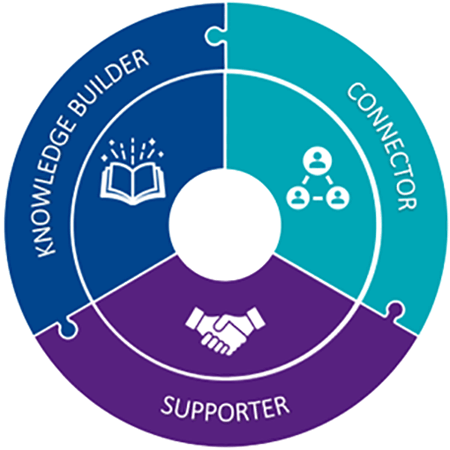Scaling Innovations
The Challenge
Around the world, individuals and institutions are finding new ways to work faster and smarter to address pressing challenges in health, education and nutrition systems. By adapting innovations to different contexts, creating novel approaches and solutions, and anticipating possible futures, these change agents are delivering better outcomes for citizens and challenging systemic inequalities.
However, far too many promising innovations fail to successfully scale their impact, due to a lack of knowledge and evidence on how to manage this long and difficult process; and weaknesses or inefficiencies in the surrounding ecosystem, including access to finance, human capital, or supportive policies and regulation.
This reality inhibits the acceleration of promising solutions and their sustainable integration into systems.
Our Approach
In partnership with change agents, we facilitate the scale-up of innovations — addressing supply and demand-side barriers to scaling the impact of individual or cohorts of innovations.
We also facilitate the strengthening of innovation ecosystems — addressing specific gaps, weaknesses and inefficiencies in the environment that are constraining innovation and scaling processes.
To achieve these goals, we work with a range of innovation ecosystem actors, including social entrepreneurs, governments, civil society organizations and development agencies. There are three key roles that we play in these partnerships:

- Knowledge-builder: We co-create knowledge products, tools and frameworks promoting equitable and inclusive innovation practice. For example, we have facilitated the development of a suite of innovation frameworks and tools through our role as the Secretariat for the International Development Innovation Alliance (IDIA).
- Connector: We connect different actors for country-led collaboration and capacity development. For example, we manage a wide range of working groups and taskforces that enable innovation experts and practitioners from different institutions and countries to share learning and act on opportunities for collaboration. Focus areas have included emerging technologies, innovation impact measurement, systems innovation, equity and inclusion, and market shaping and innovative financing.
- Supporter: We provide direct innovation support in response to demand from innovators and country-level ecosystem actors. For example, under the FCDO-funded COVIDaction initiative, we provide financial support, technical assistance and peer learning opportunities to nine innovators that are working toward the resilience of health systems across Africa and in Bangladesh.
In all of our engagements, we prioritize:
- Ownership and leadership by country actors, in order to support stronger and more sustainable institutions and processes.
- Contextualizing our work within an ecosystem, in order to minimize duplication and strengthen collaboration across the different actors who play a role in scaling innovations and driving systems change.
- Experimentation and learning, which are essential to deliver impact.
- Adopting a broad definition of innovation as ‘solutions with the transformative ability to accelerate impact’, recognizing that this can include new products and services, partnerships, policies and business models.
Our Results
- Co-designing the Whistler Principles to Accelerate Innovation for Development Impactin partnership with members of the International Development Innovation Alliance, which were adopted by G7 member countries (Canada, France, Germany, Italy, Japan, UK, USA) in 2018.
- Providing scale-up support to 9 innovators implementing technologies to contribute to health systems resilience through the FCDO-funded COVIDAction initiative.
- Co-designing a model to improve the public sector demand for, and scaling of, innovations aligned with local and national government health priorities that is currently being tested in two counties in Kenya.
- Supporting the Government of Vietnam (Ministry of Science and Technology) and the Australian Department for Foreign Affairs and Trade (DFAT) in shaping innovation policy frameworks and partnerships to drive inclusive socio-economic development.
- Building a global cadre of over 100+ innovation leaders from diverse institutions and countries through the IDIA Managing Innovation for Impact training course.
- Co-designing the first OECD-DAC Peer Learning Review on Innovation in 2019, which led to the creation of a dedicated OECD Innovation for Development Facility.
- Partnering with the United Nations Department of Economic and Social Affairs to run an annual open Call for Innovations. Winners from the 2020 and 2021 Call, were featured in a dynamic Virtual Innovation Exhibit at the UN’s 2021 Science, Technology, and Innovation Forum. This 6-part panel series celebrated innovators working on education; food security; maternal, newborn, and child health; the environment or vulnerable communities.
- Providing direct support to the World Health Organization Digital Health & Innovation Team in designing the first ‘Innovation in Health’ strategy launched by Director General Dr Tedros Adhanom Ghebreyesus in May 2021.
- Designing and launching the Million Lives Collective, bringing greater profile to innovations that are having significant impact and attracting additional support for their scale-up.
- Developing and managing Global Innovation Exchange (GIE) – a technology platform with the largest database of 16,000+ development innovations connecting innovators with funding and exposure opportunities.
- Designing and supporting the evolution of several other successful global knowledge and networking communities that are promoting the spread of promising innovations globally, including The Center for Health Market Innovations (CHMI) and The Center for Education Innovations (CEI).
Photo credit: USAID/Matthieu Young under Creative Commons, Attribution-NonCommercial 2.0 Generic (CC BY-NC 2.0) license














